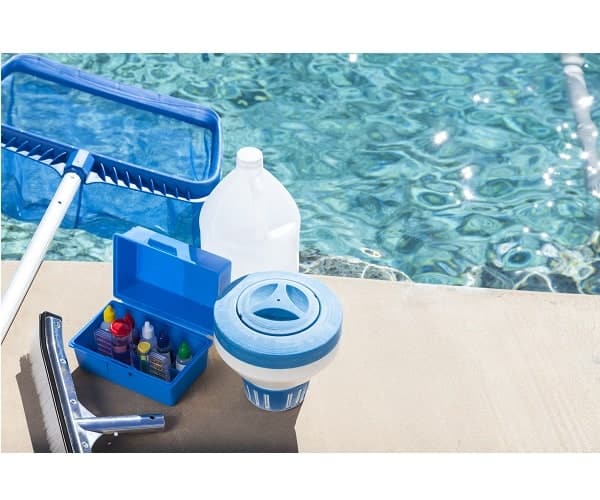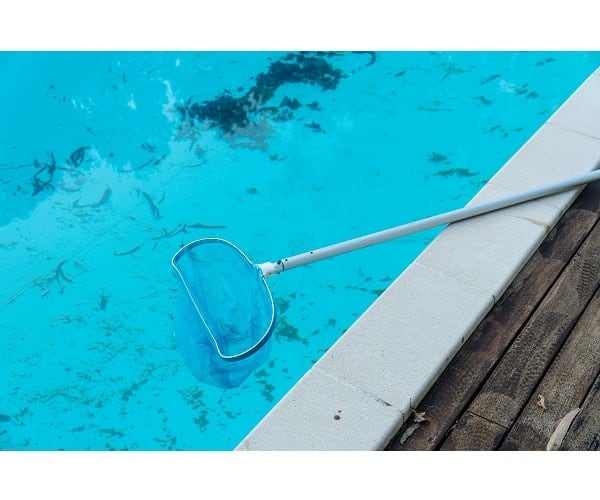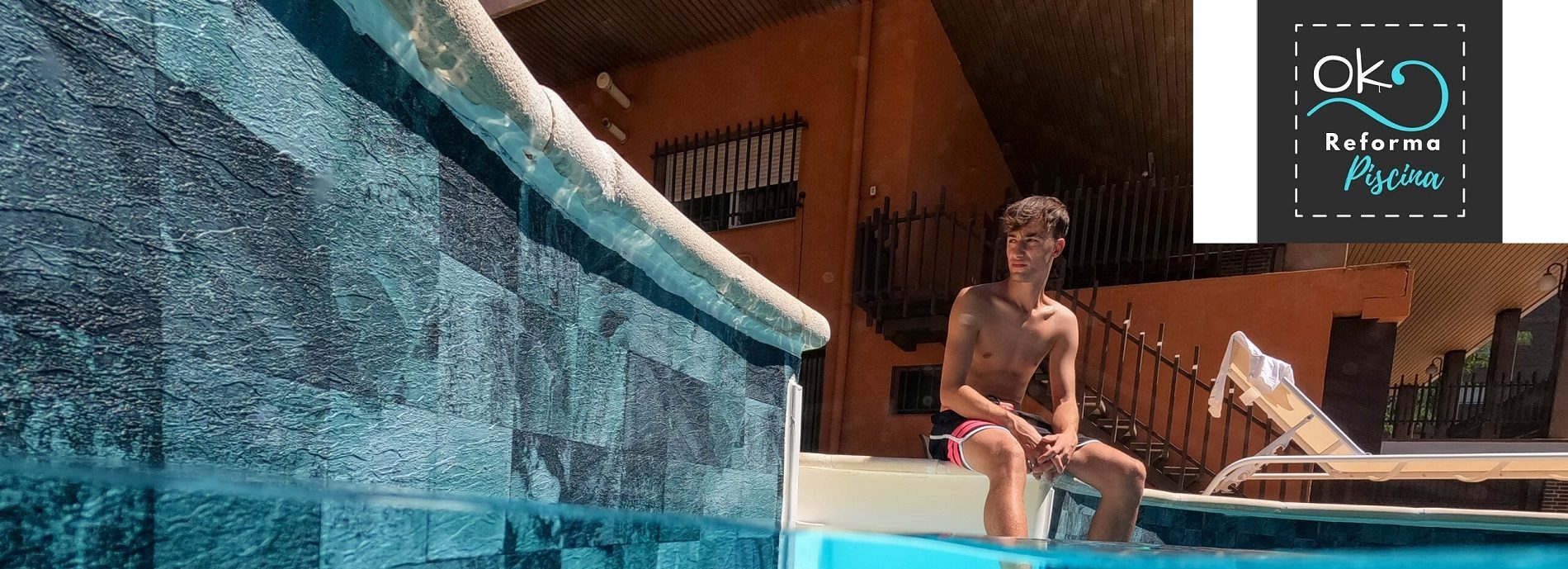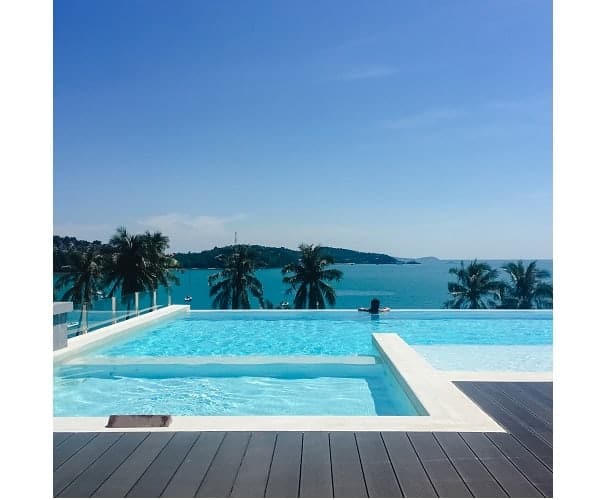
Table of contents of the page
First of all, within Ok Pool Reform and within the section of What is salt chlorination, types of Saline Electrolysis equipment and difference with chlorine treatment We present you an entry about What is better salt or chlorine pool to disinfect pools?
What is better salt or chlorine pool to disinfect pools?

There are two popular options for disinfecting pools: saltwater systems and chlorine, but which is better?
It's pool season, and that means it's time to start thinking about keeping your swimming area clean and safe.
So, below, we analyze both options to help you make the best decision for your pool.
WE BELIEVE THAT A SALT POOL IS BETTER
What is salt chlorination?

What is pool water disinfection with salt?
- Disinfecting pool water with salt is a popular and effective method to ensure clean and safe swimming conditions.
- It works by using an electrolytic process to convert salt to chlorine, which kills bacteria, viruses, algae and other microorganisms in the water.
- The chlorine then dissipates from the water within days or weeks, depending on how the pool is used.
- This natural disinfection system is much safer than traditional chemical treatments, as it does not carry the same health risks associated with chemicals such as bromine or chlorine gas.
- Additionally, it can be more profitable due to the lower electric bill associated with powering the electrolysis process.
- To ensure that your pool remains free of contaminants, periodic testing should be performed to monitor salt levels and determine the need for additional salt or system maintenance.
- With proper care, disinfecting pool water with salt can provide safe, clean swimming conditions for you and your family.
Advantages and disadvantages of saltwater pools
Saltwater pools are increasingly popular as they allow chlorine-free swimming.
Although this type of pool may be attractive to some, it is important to remember that they have advantages and disadvantages.
- Disinfecting swimming pools with a salt chlorinator without the use of chlorine is a decisive advantage for the health of the skin and respiratory system that increases the beneficial sense of swimming in pools free of sodium hypochlorite and chlorine; For example, not having to deal with the irritating smell of chlorine or red eyes after swimming.
- The use of a salt chlorinator to purify a pool with salt water will help you enjoy a clean pool, without bacteria, fungi, or any type of health risks due to the presence of pathogenic or toxic agents. It is a reality.
- On the other hand, it is important to note that saltwater pools require considerable maintenance, including careful monitoring of the pH balance.
- Likewise, they also need frequent cleaning to prevent corrosion and reduce calcium buildup on components such as pumps and filters.
What does traditional disinfection with chlorine consist of?
What is disinfecting pool water with chlorine?
- Firstly, effective disinfection of pool water with chlorine is essential to ensure swimming safety.
- Chlorine is a powerful disinfectant that eliminates bacteria, viruses, algae and fungi from water to prevent illness.
- To ensure effective disinfection, a certain amount of chlorine must be added regularly to the pool water.
- The amount of chlorine needed depends on several factors, such as temperature, pH levels and bather load.
- It should also be checked and adjusted periodically based on these factors to maintain an optimal level of sanitation in the pool at all times.
- Regular maintenance, such as cleaning filters, should also be performed along with proper chlorination so that pool water remains clean and pathogen-free.
- Disinfecting pool water with chlorine is an effective way to keep pools safe and enjoyable for everyone.
Advantages and disadvantages of chlorine pools

Swimming pools can be a fun way to cool off during the hot summer months, and many choose to treat their water with chlorine for health purposes.
Although chlorine is effective in cleaning and disinfecting pool water, it has advantages and disadvantages.
- On the positive side, chlorine keeps bathers safe from disease-causing bacteria and other harmful microorganisms.
- Elsewhere, unlike saltwater or ozone systems, they are relatively cheap to maintain.
- Although, too much chlorine produces an unpleasant odor, as well as skin and eye irritation.
- Separately, ultrachlorination treatments reduce the pH balance of pool water, making your body suffer when swimming.
What is better, chlorine or salt?

Wondering which is better for your pool: chlorine or salt? Both have their pros and cons, so it's important to weigh your options before making a decision.
Read on to learn more about chlorine and salt pools so you can decide which one is right for you.

Chlorine is better at killing bacteria and viruses
Chlorine is widely considered one of the most effective means of eliminating bacteria and viruses.
- It has been used for centuries to disinfect and clean water, but its use is much more widespread today.
- Thanks to its relatively low cost and wide availability, chlorine is now found in many household cleaners and disinfectants, making it easy to use on any type of surface or object.
- While other disinfectants may have different strengths and weaknesses when it comes to eliminating certain types of microorganisms, chlorine is known for its great effectiveness in eliminating almost all types of bacteria, fungi, protozoa and viruses.
- With this excellent performance track record, it's clear why chlorine remains an invaluable tool for keeping living spaces hygienic and safe from infectious diseases.
Salt is best for softening water

Adding salt to water is one of the simplest and most effective ways to soften it. By adding salt, the amount of minerals such as calcium and magnesium is reduced.
- This changes the composition of the water and makes it much gentler on pipes, hoses, and appliances.
- Softened water is also better for washing clothes, dishes, and bathing.
- Additionally, salt is often more affordable than other alternatives, such as reverse osmosis or permanent softening systems, making it a very cost-effective option for those looking for a solution to their hard water problem.
Chlorine is better at preventing algae growth

Is the salt pool exempt from having green water?

Do not ignore the green pool water, put a solution, now!
Chlorine has long been recognized as one of the best ways to prevent algae growth in swimming pools and other aquatic features.
- Its continuous production of microorganisms is specially adapted to break down contaminants before they spread, making it the ideal choice for any home with a pool or hot tub.
- Although chlorine requires routine maintenance, such as regularly checking levels and flushing the water regularly to ensure maximum effectiveness, those who take on this responsibility will be pleasantly surprised at how easy chlorine is to use and maintain over the long term.
- The final benefit? A crystal-clear pool that both adults and children can safely enjoy
Salt is best for reducing chlorine smell

Salt is one of the most effective ways to reduce or eliminate chlorine odors in the pool
- First and foremost, adding salt to a pool can help reduce chlorine odors and create a healthier swimming environment.
- Together, salt acts as a natural disinfectant, neutralizing the chloramines that cause strong chlorine odors.
- The amount of salt needed for this process varies depending on the size of the pool, but usually ranges between 3.000 and 10.000 ml for most pools.
- Likewise, adding salt to your pool is easy and can be done by purchasing a salt chlorination system, using a pre-measured bag of salt, or mixing salt into the pool water manually.
- Once the salt is added, it will take 4 to 8 hours for the chlorine levels to reduce enough to notice a difference in smell.
- Likewise, adding salt to your pool only takes a few minutes and can be done quickly and easily with the right equipment.
- Be sure to carefully follow all instructions when using salt to ensure the process is effective and safe.
- In closing, with proper use, adding salt to your pool can help reduce chlorine odors and create a healthier environment for everyone who swims in it.
Chlorine is better for preventing stains

Rust stains in the pool? Causes of the common problem in swimming pools that use chlorinated water

How do I remove stains from my pelopincho pool?

How to clean a stained canvas sink and prevent mold from forming

Stains in fiberglass pools
Chlorine is an ideal option to prevent stains thanks to its effective whitening capacity.
- Chlorine not only helps reduce stains, but also prolongs the life of fabrics by eliminating bacteria and other substances that break down fibers.
- Apart from reducing odors in fabrics, chlorine also prevents the formation of mold and mildew on fabrics, protecting them even more.
- By regularly adding a small amount of bleach to fabrics, you can enjoy clothing and bedding that stays brighter, cleaner, and more durable for longer.
What type of pool is best for the environment
Salt is better for the environment
When it comes to the environment, both chlorine and saltwater pools have their pros and cons.
- Chlorine pools are easier to maintain and require fewer chemicals, but they produce more chlorine byproducts that can be harmful to aquatic ecosystems. Saltwater pools, on the other hand, use an electrolysis system to convert sodium chloride (salt) into chlorine, which is then used to clean the pool.
- This process helps reduce the amount of additional chemicals needed, making them better for the environment than traditional chlorine pools in terms of chemical runoff.
- However, saltwater systems continue to release chlorine byproducts as well as small amounts of salt into nearby water sources, which can also have a negative impact on aquatic environments.
- Ultimately, both types of pools can be harmful to the environment if not properly maintained, so it is important for pool owners to be aware of their impact and take steps to reduce their environmental footprint.
In conclusion, both chlorine and saltwater pools can affect the environment.

The bottom line is that both chlorine and saltwater pools can have a negative impact on the environment, depending on how they are maintained and used.
- Although saltwater systems are less reliant on additional chemical inputs, they still release chlorine byproducts and small amounts of salt into nearby water sources, which can have a negative impact.
- Therefore, it is up to pool owners to ensure that they maintain them responsibly and are aware of any potential environmental impacts.
- This ensures the safety and enjoyment of the pool, while protecting the environment.
- In summary, both chlorine and saltwater pools can have an environmental impact, depending on how they are maintained and operated.
- Pool owners should be aware of the potential environmental effects of each type of pool and take steps to reduce their ecological footprint through responsible maintenance practices.
- This ensures that the pool is kept clean and safe, while protecting the environment.
By taking the time to educate themselves about their specific pool system, homeowners can make informed decisions about what type of pool is best for them and the environment.
With proper attention and maintenance, any type of pool can provide an enjoyable experience while respecting natural resources.
- Under this, everyone can continue to enjoy swimming and the environment can remain healthy and safe.
The most environmentally friendly type of pool is the natural pool.
These pools are designed to be self-sufficient, using plants and water to naturally filter, circulate and clean the water.
- Natural pools do not require harsh chemicals or electricity to stay balanced, eliminating numerous sources of environmental damage.
- The only maintenance required is to remove waste and add plants as necessary.
- Larger homeowners may also consider an infinity pool. This type of pool creates the illusion of an endless pool by allowing excess water to pour over the edge and return to the same body of water. Infinity pools use fewer chemicals than traditional pools and recirculate their own water, making them much more energy efficient than those that rely on filters. Both natural and infinity pools offer homeowners a way to add luxury to their garden while significantly reducing their environmental impact.
Which type of pool is easier to maintain, salt or chlorine?

Useful guide to know how to clean the pool

Guide to maintaining a pool with water in perfect condition
When asking what type of pool is easier to maintain, saltwater pools have a clear advantage over chlorine pools.
In general, saltwater pools are easier to maintain than chlorine pools, as their self-regulating system requires fewer additions of chemicals to balance them.
- Saltwater pools require fewer chemicals and less maintenance than chlorine pools.
- The salt in the water acts as an electrolyte, breaking down into chlorine and other compounds that help keep the water clean and free of bacteria or algae.
- Saltwater pools provide a softer feel on the skin compared to chlorinated water and have less unpleasant chlorine odor.
- This means that saltwater pools can stay balanced for longer with fewer adjustments and chemical treatments. Additionally, many people find that saltwater pools provide a gentler feel on the skin compared to traditional chlorine pools.
- For these reasons, many people choose saltwater pools instead of traditional chlorine ones.
By comparison, chlorinated pools require more frequent chemical testing and adjustments to stay balanced and are not always easy to maintain without professional help.
- Chlorine pools also give off a strong chemical odor and can be harsh on the skin.

The cost difference between salt pools and chlorine pools
Pool maintenance usually requires salt or chlorine, but which is best for you?
Knowing the cost difference between the two types of pools can help you make an informed decision.
- In general, chlorine pools are cheaper than saltwater pools.
- Saltwater pools require more regular maintenance and their systems often require more expensive parts due to potential damage caused by high levels of salt.
- However, saltwater pools offer a gentler experience with fewer environmental risks, so if you're thinking about installing an outdoor pool in your home, do your research to determine which option best fits your budget and priorities.







